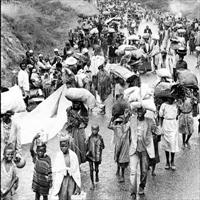BURUNDI-TANZANIA: New beginnings for the "1972 refugees"

Banguabo Mosozi, 68, was a young man when he fled neighbouring Burundi to Tanzania, escaping violence that is estimated to have killed at least 200,000 people. That was in 1972.
Now, a father of 14 with four wives, Mosozi is one of the 218,000 Burundian refugees living in three settlements in the western Tanzanian regions of Tabora and Rukwa.
Like his fellow refugees, he faces the prospect of staying in Tanzania or returning home because the settlements - Ulyankulu, Katumba and Nishamo - are being closed down by Tanzanian and Burundi authorities, in collaboration with the UN Refugee Agency (UNHCR).
"In Burundi you will participate in the unfolding peaceful and democratic process, as well as take part in the reconstruction of the country," UNHCR chief Antonio Guterres told the refugees at Ulyankulu on 8 March.
The day Guterres visited, with Khamis Kagasheki, Tanzania’s deputy home affairs minister, a registration exercise began in which the refugees would choose between going back to Burundi or applying for Tanzanian citizenship.
"For those who now feel that you are now more Tanzanian and pleased to remain, the government has generously offered to consider your application for citizenship in accordance to the country’s laws," Guterres said.
Some 20 percent of the refugees, according to UNHCR, expressed their wish during a 2007 population registration to return to Burundi. Another 172,000 indicated their wish to remain in Tanzania.
"No one should hold refugee status permanently," Kagasheki said at a send-off ceremony, where a train carrying the first 255 refugees returning to Burundi was flagged off a railway station at Katumba.
"To be a refugee is a temporary status and there must be justifications for such a situation," the minister added.
Choices
At the camps, many refugees, especially those younger than 40, seemed reluctant to return to Burundi, saying they arrived in Tanzania as toddlers and have no idea of the reality back home.
"I am so used to this place," Absalom Frederick, 40, a father of six, told IRIN. "Many times I have heard of horrible stories about what made us flee Burundi. I will remain here for the rest of my life. I am very comfortable."
Banyutilieko Anania, 64, said as much as he loved his home country, he was reluctant to leave. "There are reports that in some parts of the country killings are going on. I may not go," Anania, a father of 14, said.
In January, Tanzanian President Jakaya Kikwete reiterated his government’s resolve to close down all refugee camps, saying there was need for a durable solution to the old settlements.
Tanzania also hosts 110,000 Burundian refugees and 96,000 refugees from the Democratic Republic of Congo (DRC) in UNHCR-managed camps in Kigoma and Kagera regions.
More than 350,000 others have returned since the start of the repatriation programme from northwestern Tanzania to Burundi in March 2002, according to UNHCR.
Land issues
The refugees raised the issue of land and women’s rights with Guterres, whose visit coincided with International Women’s Day on 8 March.
"Our appeal to governments of Burundi and Tanzania is that women must have access to land, education and healthcare facilities," one of the messages read. "This should be the case for those returning to Burundi and those opting to take up Tanzanian citizenship."
John Magufuli, former Tanzanian land minister, told IRIN the country's laws prevented a foreigner from occupying land. Only through naturalisation could one expect the right of occupancy.
Kagasheki said those who would apply for Tanzanian citizenship through naturalisation should not expect to continue living in the settlements. "They will relocate to other parts of the country," he said.
In a meeting on 10 March with donors in the commercial capital of Dar es Salam, Guterres renewed an appeal to the international community to support the resettlement programme.
"Tanzania has assured the protection of refugees on behalf of the international community," he told a news conference. "It is now time for the rest of the world to show solidarity with Tanzania, especially in the phase of final integration in the country."
The programme will rely heavily on support from donors and on 21 February, UNHCR launched an appeal for US$34.29 million. So far, pledges totalling almost $9 million have been received.
Guterres hailed the so-called "1972 refugees", saying they were not a heavy burden on the agency and the host country because they were able to feed themselves and sell their surplus produce in markets near their settlements.
"During my visit, most of the land reserved for the settlement was intensively cultivated and different crops were doing well. It was all green," he said.
 Back and Next - Back and Next
Back and Next - Back and Next See Also - See Also
See Also - See Also